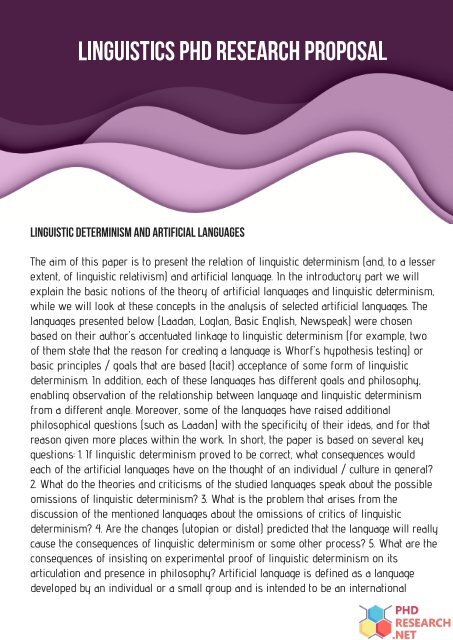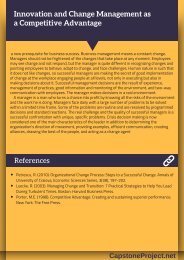Linguistics Phd Research Proposal
Hello! Do you know about linguistics PhD research proposal? Read more here https://www.phdresearch.net/
Hello! Do you know about linguistics PhD research proposal? Read more here https://www.phdresearch.net/
Create successful ePaper yourself
Turn your PDF publications into a flip-book with our unique Google optimized e-Paper software.
LINGUISTICS PHD RESEARCH PROPOSAL<br />
LINGUISTIC DETERMINISM AND ARTIFICIAL LANGUAGES<br />
The aim of this paper is to present the relation of linguistic determinism (and, to a lesser<br />
extent, of linguistic relativism) and artificial language. In the introductory part we will<br />
explain the basic notions of the theory of artificial languages and linguistic determinism,<br />
while we will look at these concepts in the analysis of selected artificial languages. The<br />
languages presented below (Laadan, Loglan, Basic English, Newspeak) were chosen<br />
based on their author's accentuated linkage to linguistic determinism (for example, two<br />
of them state that the reason for creating a language is Whorf's hypothesis testing) or<br />
basic principles / goals that are based (tacit) acceptance of some form of linguistic<br />
determinism. In addition, each of these languages has different goals and philosophy,<br />
enabling observation of the relationship between language and linguistic determinism<br />
from a different angle. Moreover, some of the languages have raised additional<br />
philosophical questions (such as Laadan) with the specificity of their ideas, and for that<br />
reason given more places within the work. In short, the paper is based on several key<br />
questions: 1. If linguistic determinism proved to be correct, what consequences would<br />
each of the artificial languages have on the thought of an individual / culture in general?<br />
2. What do the theories and criticisms of the studied languages speak about the possible<br />
omissions of linguistic determinism? 3. What is the problem that arises from the<br />
discussion of the mentioned languages about the omissions of critics of linguistic<br />
determinism? 4. Are the changes (utopian or distal) predicted that the language will really<br />
cause the consequences of linguistic determinism or some other process? 5. What are the<br />
consequences of insisting on experimental proof of linguistic determinism on its<br />
articulation and presence in philosophy? Artificial language is defined as a language<br />
developed by an individual or a small group and is intended to be an international
LINGUISTIC DETERMINISM AND ARTIFICIAL LANGUAGES<br />
language or designed for a more specific purpose but is not intended to function as the<br />
mother tongue of its users.<br />
It is added that all the artificial languages in common are that rules and precise definition<br />
of vocabulary come before the use of the language. Also, there is a clear difference<br />
between artificial and formal languages. In formal languages, each element and each<br />
combination has a clearly defined unambiguous meaning (as in the chemical formula, for<br />
example), and the simplicity of pronunciation of such formulations is not taken into<br />
account. On the other hand, artificial language is not expected to understand the meaning<br />
of the word unambiguously from the meaning and arrangement of its constituent parts,<br />
nor does the sentence always be unequivocally defined by the words it creates - the<br />
possibility of using the context and the common sense reduce the requirement of the<br />
criterion. Artificial languages can be divided into a priori and a posteriori languages. A<br />
priori languages are those whose words (in a formal sense) are not based on any of the<br />
existing languages - such as Laadan. A priori languages are sometimes referred to as<br />
philosophical languages as some of them, besides morphine modifications, also want to<br />
radically differently assign meaning to words or segment reality in a different way. On<br />
the other hand, a posteriori language uses either one language for your podium (say<br />
Basic English or Newspeak) or combine several of them (Logan or Esperanto). They are<br />
divided into simplified languages (Basic English), naturalistic languages (which are close<br />
to natural languages, most often Latin) and autonomous languages, which borrow morphs<br />
of natural languages, but prior to the grammar level. In addition to artificial and formal<br />
languages, certain authors also mention the term 'created' languages, whose purpose is to<br />
create a certain meaning in narrative works. Such languages do not have to be complete -<br />
they can consist of only a few words, but it is considered that by referring only a few<br />
examples of such an incomplete language can be achieved the presentation of the<br />
worldview that is in the background.
LINGUISTIC DETERMINISM AND ARTIFICIAL LANGUAGES<br />
Two of the languages that we will present below are created as languages, but one of<br />
them (Laadan's native language) develops into an artificial language, while Orwell's<br />
Newspeak never comes to such degree of maturity (nor is it, given the philosophy it<br />
transposes, intended to be).<br />
However, such a created language is involved in this work because of its relevance for the<br />
discussion of linguistic determinism. Artificial languages are specific to their relationship<br />
with meaning. Namely, very often (as we will see below), artificial languages are a sort of<br />
utopian project of language creation that will perfectly translate desired meanings -<br />
concepts, tone of message, rationality of the court - or help to create a clear structure of<br />
meaning. Such projects often originate from the "common sense" ideas that in the<br />
artificial language a particular lexical unit should be created that will refer to something in<br />
our living experience, more or less specific. However, theories of meaning suggest that<br />
such ideas open up certain problems - the relationship between language, reality, mind<br />
and meaning is complex and up to now unclear. Given the extent and dissatisfaction of<br />
the problem, the following work will be limited to emphasizing the non-critical use of the<br />
idea of referentiality of a particular author and its consequences for his / her theory.<br />
Apart from the problem of meaning, artificial languages also face the problem of<br />
sociability. Namely, one of the main features of natural languages is their sociability -<br />
they are formed through (more or less equally) communication between different<br />
individuals, communities, societies, peoples and classrooms. It can be concluded that the<br />
lack of such a common creation is what artificial languages make different from natural<br />
languages, at least in their initial stages. In order to make the phenomenon of sociality of<br />
language and alternative interpretation of meaning connected with philosophy, we will<br />
refer to the later period of philosophy of Ludwig Wittgenstein, especially when discussing<br />
the phases (accepted) of artificial language, and the theorizing of indirect sociability,<br />
which the artificial language project can lead to in question.
LINGUISTIC DETERMINISM AND ARTIFICIAL LANGUAGES<br />
Also, the social nature of language is especially important for distinct views, which<br />
criticize the creation of artificially modified languages by the ruling / dominant party.<br />
Linguistic determinism is defined as a hypothesis that states that "language influences<br />
thought or is completely determined, and that due to the fact that language is shared by a<br />
community of speakers, language influences or determines ways of thinking of a<br />
particular culture." The strong version of linguistic determinism claims that the language is<br />
completely determined by the thought, while the weak claims to only affect the thought.<br />
More specifically, the language most often implies morph-syntactic elements (but may be<br />
pragmatic or phonological), while thought / mind implies (depending on the subtheme)<br />
perception, attention, classification of reality, memory, creativity, or aesthetic judgment.<br />
Linguistic relativism is the theory that languages can differentiate between them at all<br />
levels (hence, there is nothing that would necessarily be common in all languages).<br />
Although linguistic relativism often equates to linguistic determinism, they are actually<br />
independent terms that can (but not necessarily) be part of the same theory. Some form<br />
of linguistic determinism has existed in the undefined form of romanticism (such as<br />
Herder) or Wilhelm von Humboldt, its clear line of development begins in the first half of<br />
the 20th century with anthropologist Franz Boas. Franz Boas (1911) publishes his<br />
hypothesis that language reflects the thought - that different cultures and their lifestyles<br />
support (and need) different grammatical forms and vocabulary. It should be noted that<br />
this view is in no case a linguist determinism, neither weak nor strong, but simply a<br />
hypothesis opposed to universalism.
REFERENCES<br />
1. Seuren, Pieter. (2013). From Whorf to Montague. Oxford: Oxford University Press.<br />
2. Boas, Franz. (1911). Introduction, Handbook of American Indian Languages. Part I.<br />
Washington: Government Print Office, Smithsonian Institution, Bureau of American<br />
Ethnology.<br />
3. Levinson S. C. (1992) Language and cognition: the cognitive consequences of spatial<br />
description in Guugu Yimithirr. Work. Pap.13. Nijmegen, Neth.





